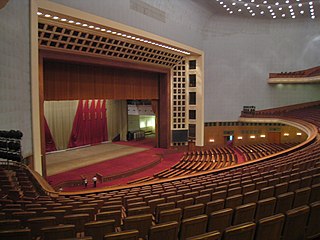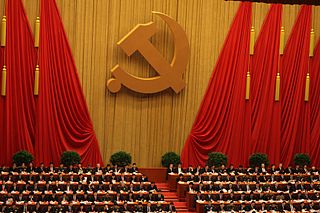
The Politburo of the Chinese Communist Party, officially the Political Bureau of the Central Committee of the Communist Party of China, is the highest political body of the Central Committee of the Chinese Communist Party.

The Politburo Standing Committee (PSC), officially the Standing Committee of the Political Bureau of the Central Committee of the Communist Party of China, is a committee consisting of the top leadership of the Chinese Communist Party (CCP). Historically it has been composed of five to eleven members, and currently has seven members. Its officially mandated purpose is to conduct policy discussions and make decisions on major issues when the Politburo, a larger decision-making body, is not in session. According to the party's constitution, the General Secretary of the Central Committee must also be a member of the Politburo Standing Committee.
The orders of precedence in China is the ranking of political leaders in China for the purposes of event protocol and to arrange the ordering of names in official news bulletins, both written and televised. It is also sometimes used to assess perceived level of political power. Although there is no formally published ranking, there is usually an established convention and protocol, and the relative positions of Chinese political figures can usually be deduced from the order in meetings and especially by the time and order in which figures are covered by the official media. Since 1982, the General Secretary of the Chinese Communist Party has been the highest-ranking official in the People's Republic of China (PRC).
The Shanghai clique, also referred to as the Shanghai gang, Jiang clique, or Jiang faction, refers to an informal group of Chinese Communist Party (CCP) officials who rose to prominence under former CCP General Secretary Jiang Zemin while he served as the party chief and mayor of Shanghai.

The National Congress of the Chinese Communist Party is a party congress that is held every five years. The National Congress is formally the highest body within the Chinese Communist Party (CCP). Since 1987 the National Congress has been held in the months of October or November. The venue for the event, beginning in 1956, is the Great Hall of the People in Beijing. The Congress is the public venue for top-level leadership changes in the CCP and the formal event for changes to the Party's Constitution. In the past two decades the National Congress of the CCP has been pivotal at least as a symbolic part of leadership changes, and therefore has gained international media attention.

The 17th National Congress of the Chinese Communist Party was held in Beijing, China, at the Great Hall of the People from 15 to 21 October 2007. Congress marked a significant shift in the political direction of the country as CCP General Secretary Hu Jintao solidified his position of leadership. Hu's signature policy doctrine, the Scientific Development Concept, which aimed to create a "Socialist Harmonious Society" through egalitarian wealth distribution and concern for the country's less well-off, was enshrined into the Party Constitution. It was succeeded by the 18th National Congress of the Chinese Communist Party.
The 15th Politburo of the Chinese Communist Party (CCP), formally the Political Bureau of the 15th Central Committee of the Communist Party of China, was elected at the 1st plenary session of the 15th Central Committee of the CCP on 19 September 1997 in the aftermath of the 15th National Congress. This electoral term was preceded by the 14th Politburo and succeeded by the 16th. Seven of the 22 members served in the 15th Politburo Standing Committee.
The 17th Politburo of the Chinese Communist Party (CCP), formally the Political Bureau of the 17th Central Committee of the Communist Party of China, was elected at the 1st plenary session of the 17th Central Committee of the CCP on 22 October 2007 in the aftermath of the 17th National Congress. This electoral term was preceded by the 16th Politburo and succeeded by the 18th. Of the 25 members, nine served in the 17th Politburo Standing Committee.

The 18th National Congress of the Chinese Communist Party was held November 8–14, 2012 at the Great Hall of the People. Due to term limits and age restrictions, seven of the nine members of the powerful Politburo Standing Committee (PSC) retired during the Congress, including Hu Jintao, who was replaced by Xi Jinping as General Secretary of the Chinese Communist Party. The Congress elected the 18th Central Committee of the Chinese Communist Party, and saw the number of Politburo Standing Committee seats reduced from nine to seven.
The succession of power in China since 1949 takes place in the context of a one-party state under the Chinese Communist Party (CCP). Despite the guarantee of universal franchise in the constitution, the appointment of the Paramount leader lies largely in the hands of his predecessor and the powerful factions that control the Central Committee of the Chinese Communist Party.

The secretary of the Central Commission for Discipline Inspection (CCDI) is the head of the aforementioned body. The office is a leading political position, and the officeholder has been a member of the Politburo Standing Committee, the highest decision-making body of the Chinese Communist Party, since 19 September 1997. The current secretary is Li Xi, who was elected by the 1st Plenary Session of the 20th Central Commission for Discipline Inspection on 23 October 2022 and approved by the 20th Central Committee on the same day. The role is roughly analogous to that of the Chairman of the Central Control Commission in other communist countries.
The 18th Politburo of the Chinese Communist Party (CCP), formally the Political Bureau of the 18th Central Committee of the Communist Party of China, was elected at the 1st plenary session of the 18th Central Committee of the CCP on 15 November 2012 in the aftermath of the 18th National Congress. This electoral term was preceded by the 17th Politburo and succeeded by the 19th. Of the 25 members, seven served in the 18th Politburo Standing Committee.
The 19th Politburo of the Chinese Communist Party (CCP), formally the Political Bureau of the 19th Central Committee of the Communist Party of China, was elected at the 1st plenary session of the 19th Central Committee of the CCP on 25 October 2017 in the aftermath of the 19th National Congress. This electoral term was preceded by the 18th Politburo and succeeded by the 20th. Seven of the 25 members served in the 19th Politburo Standing Committee.
The 20th Politburo of the Chinese Communist Party (CCP), formally the Political Bureau of the 20th Central Committee of the Communist Party of China, was elected at the 1st plenary session of the 20th Central Committee of the CCP on 23 October 2022 in the aftermath of the 20th National Congress. This electoral term was preceded by the 19th Politburo. Seven of the 24 members serve in the 20th Politburo Standing Committee.
The 20th Politburo Standing Committee of the Chinese Communist Party, formally the Standing Committee of the Political Bureau of the 20th Central Committee of the Communist Party of China, was elected by the 1st plenary session of the 20th Central Committee on 23 October 2022, in the aftermath of the 20th National Congress of the Chinese Communist Party (CCP). It was preceded by the 19th Politburo Standing Committee.
The 18th Politburo Standing Committee of the Chinese Communist Party, formally the Standing Committee of the Political Bureau of the 18th Central Committee of the Communist Party of China, was elected by the 1st plenary session of the 18th Central Committee on 15 November 2012, in the aftermath of the 18th National Congress of the Chinese Communist Party (CCP). It was preceded by the CCP's 17th Politburo Standing Committee and was succeeded by the 19th in 2017.
The 16th Politburo Standing Committee of the Chinese Communist Party, formally the Standing Committee of the Political Bureau of the 16th Central Committee of the Communist Party of China, was elected by the 1st plenary session of the 16th Central Committee in 2002, in the aftermath of the 16th National Congress of the Chinese Communist Party (CCP). It was preceded by the CCP's 15th Politburo Standing Committee and was succeeded by the 17th in 2007.
The 19th Secretariat, formally the Secretariat of the 19th Central Committee of the Communist Party of China, was nominated by the 19th Politburo Standing Committee and approved by the 1st Plenary Session of the 19th Central Committee on 25 October 2017, in the aftermath of the 19th National Congress of the Chinese Communist Party (CCP). This electoral term was preceded by the 18th Secretariat, and succeeded by the 20th in 2022.
The 18th Secretariat, formally the Secretariat of the 18th Central Committee of the Communist Party of China, was nominated by the 18th Politburo Standing Committee and approved by the 1st Plenary Session of the 18th Central Committee on 15 November 2012, in the aftermath of the 18th National Congress of the Chinese Communist Party (CCP). This electoral term was preceded by the 17th Secretariat and succeeded by the 19th in 2017.
The 17th Secretariat, formally the Secretariat of the 17th Central Committee of the Communist Party of China, was nominated by the 17th Politburo Standing Committee and approved by the 1st Plenary Session of the 17th Central Committee on 22 October 2007, in the aftermath of the 17th National Congress of the Chinese Communist Party (CCP). This electoral term was preceded by the 16th Secretariat and succeeded by the 18th in 2012.











